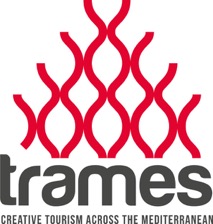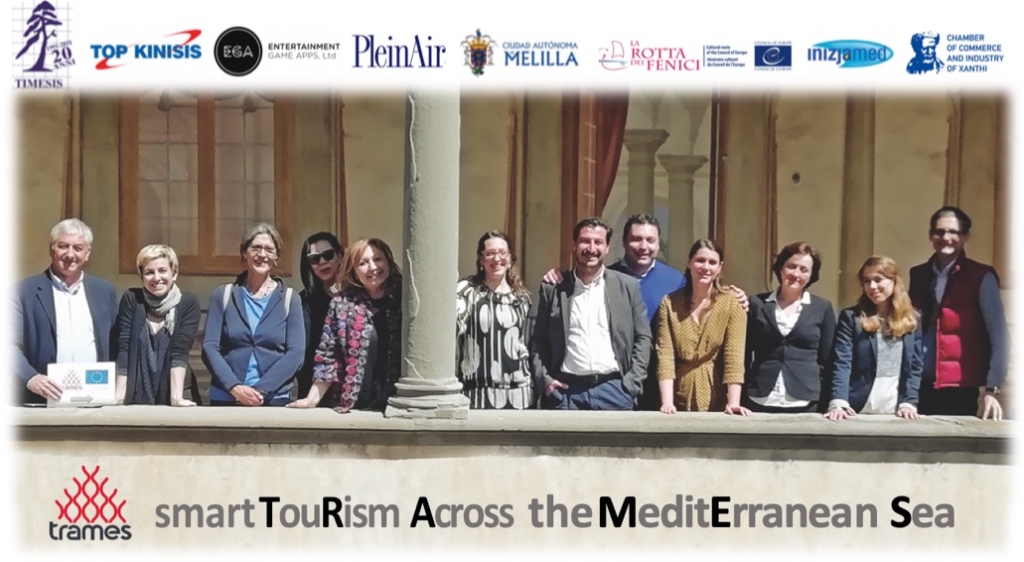Project Description
TRAMES – smart Tourism Across the Mediterranean Sea
The TRAMES project is co-financed by the European Union within the COSME Programme and is based on the Phoenicians’ Route, a transnational route included since 2003 in the Council of Europe’s “Cultural Routes” Programme and recognised by the World Tourism Organisation since 2016. The Phoenicians’ Route promotes the cultural and archaeological heritage of Mediterranean civilisations following the ancient nautical and maritime routes and offers considerable potential for promotion, visibility and development of related tourism products.
Officially launched on March 2019, TRAMES provides for the creation of eight Smart Ways (routes based on innovative and current topics including sustainability, creative tourism, active involvement of local populations and entrepreneurs) and as many heritage interpretation centres where local communities will be at the centre of the tourism offer; the organisation of an Intercultural Dialogue Festival circuit with seven events in five different countries and the development of a video game based on the trade routes of the ancient Mediterranean as a tool to promote the territories involved and their assets.
Among the goals of the initiative, there are the revitalisation of the EU destinations, and the deseasonalisation and the implementation of the sustainability of tourism offers. At the same time, the project aims to promote collaboration between tourism operators and cultural industries of the participating countries and the creation of solid public-private partnerships in the areas involved, promoting exchanges of experience and expertise at an international level.
The transnational thematic products of TRAMES will represent the direct output of the Route’s innovation strategy on:
a) Creativity and Creative Tourism – emphasising the value of the experiential, emotional and sensorial element, that make the consumer the absolute protagonist of a narrative built specifically for him. The tourism experience is not an end in itself, it is not passive and does not end at the same moment in which it is carried out. We propose a concept of tourism that offers visitors the opportunity to develop their creative potential through the participation in educational activities and experiences, features of the holiday destination where they travel;
b) Heritage Pedagogy -development of a new creative narrative (storytelling and storydoing, heritage interpretation) using the local register and narrative culture, focusing on memory and identity to promoting the direct involvement of users;
c) Creation of innovative edutainment technologies as tools to engage tourists and promote, with the active involvement of local communities, both the tangible and intangible heritage of the destination, encouraging the creation of a new form of tourism where both the tourist and the community take an active part in shaping and creating the tourist experience;
d) Gamification as a way to attract, engage and educate visitors on cultural heritage, give destinations a global visibility, encourage users to interact with the places and their cultural and natural heritage;
e) Internationalization -identification of the most active local stakeholders (publics and privates) for the promotion of heritage and tourist offer within the International Network of the Phoenicians’ Route, which is able to offer large international visibility through the implementation of creative and communication best practices;
f) Deseasonalisation -the innovative methodology allows to shift from a destination tourism to a motivation tourism which is not linked to seasonality;
g) Sustainability and involvement of local communities (community tourism) with positive effects on employment at local level, by developing new professional skills in currently vacant roles and renforce SMEs.
Furthermore, the project intends to strengthen the intercultural mediterranean dialogue recreating a Mediterranean community (koiné) with real power and resource.
For more information visit the official webpage of the project at: https://www.tramesproject.eu
For further information please contact:

The content of this publication represents the views of the author only and is his/her sole responsibility; it cannot be considered to reflect the views of the Executive Agency for Small and Medium-sized Enterprises or any other body of the European Union.
The European Commission and the Agency do not accept any responsibility for use that may be made of the information it contains.
This publication was co-funded by the European Union’s COSME Programme.
TRAMES NEWS


